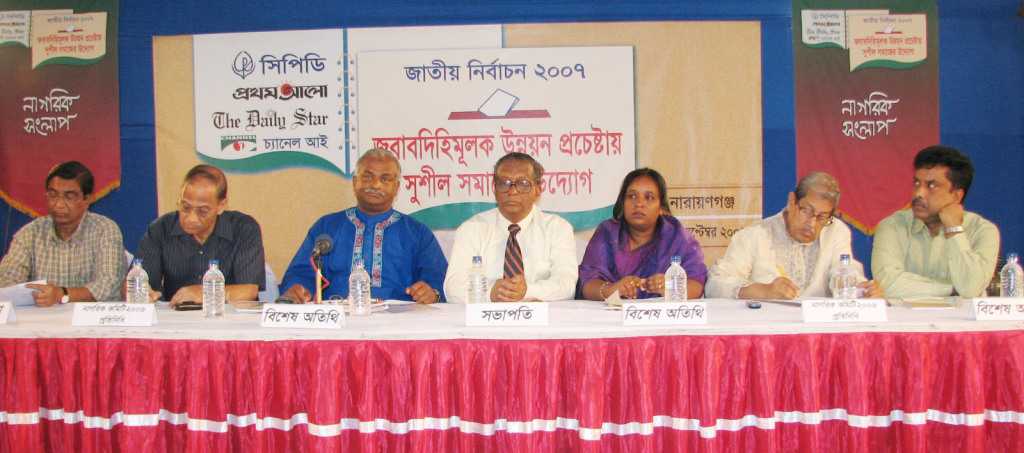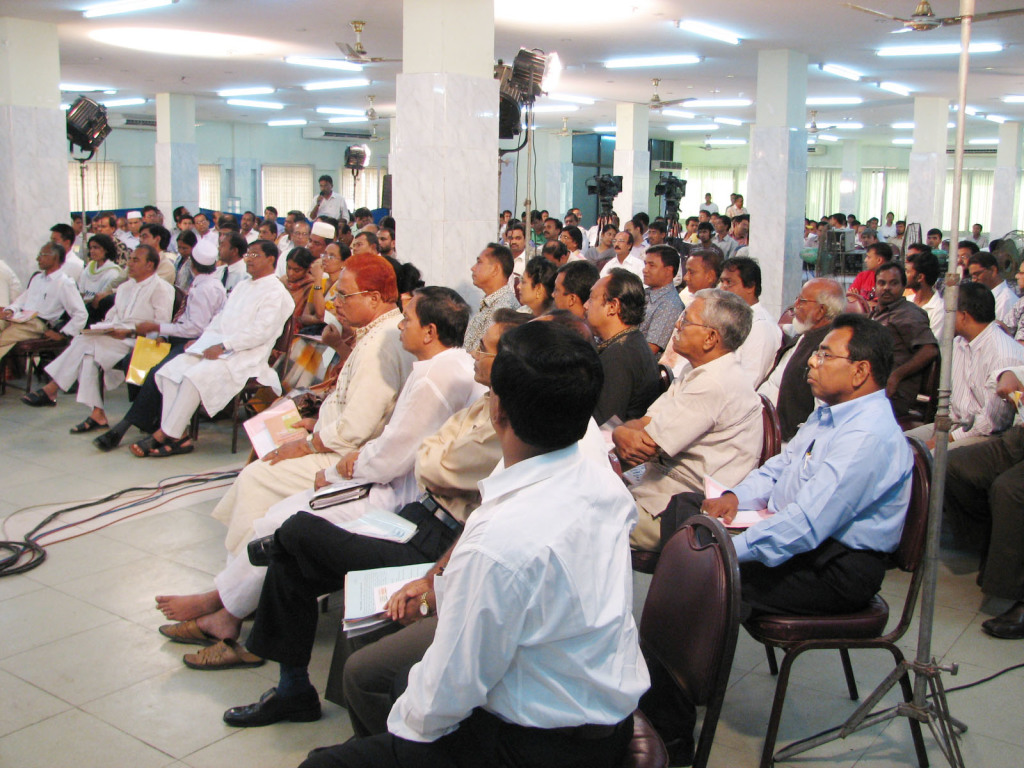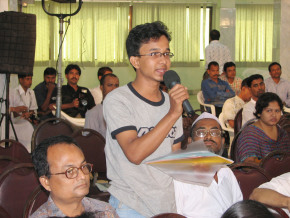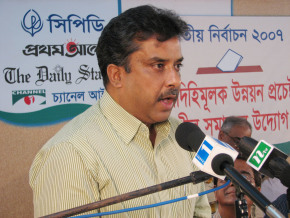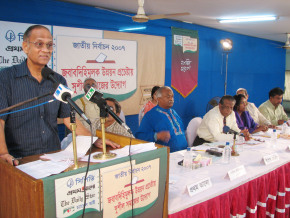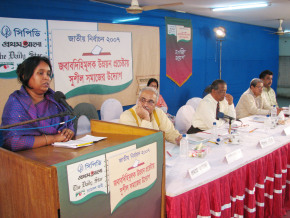Speakers at the regional dialogue in Narayanganj (September 09, 2006) observed that much of the reforms in the Election Commission (EC) and electoral system can be carried out during the tenure of the next caretaker government.
As the civil society raised voice for bringing reforms, major political parties will also accept the decisions taken by the caretaker government in this regard, they pointed out.
The speakers further said politicians often become hostages to bureaucrats who actually run the government and indulge in various corruptions.
The Centre for Policy Dialogue (CPD) organised the event in collaboration with The Daily Star, the Prothom Alo and Channel i.
Yesterday’s dialogue was the 15th and the last in a series of such regional dialogues which started in Mymensingh on Arpil 29 this year.
Executive Director of CPD Debapriya Bhattacharya conducted the seven-hour long dialogue chaired by Afzal Hossain, a former member of the parliament also founding general secretary of Narayanganj Diabetic Association.
Motiur Rahman, editor of the Prothom Alo, spoke on behalf of the organisers while Prof Anisuzzman and former member of a caretaker government Major General (retd) Moinul Hossain Chowdhury participated in the dialogue on behalf of Nagorik Committee 2006, formed to prepare a vision paper for ‘Bangladesh in 2021’.
Chairman of Naryanganj Pourashava Selina Hayat Ivy, Chairman of Bangladesh Road Transport Corporation (BRTC) Advocate Toimur Alam Khondoker, and President of Bangladesh Knitwear Manufacturers and Exporters Association (BKMEA) Fazlul Haque were special guests.
A total of 85 persons took part in the discussion including teachers, lawyers, political leaders, journalists, cultural activists, NGO workers and students. A large number of local elites attended the dialogue in Narayanganj Club Community Centre.
The speakers pointed out that the EC is not strong enough for holding a free and fair election as it failed to prepare an acceptable voter list. They also proposed introduction of ‘no votes’ in cases where a voter might have objections to a particular candidate, and of a provision for ‘dual votes’ allowing voters to vote for more than one person with serial numbers of preferences for avoiding by-elections.
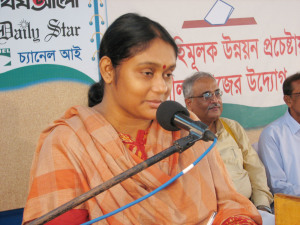 They suggested decentralisation of administrative power and strengthening of local administrations as the power is very much concentrated in the capital now.
They suggested decentralisation of administrative power and strengthening of local administrations as the power is very much concentrated in the capital now.
Speaking as a special guest Selina Hayat Ivy called upon the people not to vote for black money holders and thugs. She also urged prospective candidates not to buy votes.
She pointed out that politicians often become hostages to bureaucrats. Although the bureaucrats run the administration, they are hardly ever blamed for corruption, she added.
She called upon the people to create resistance against black money holders, thugs and plunderers. Ivy also urged the people to be united against anti-liberation forces.
Toimur Alam Khondoker said the people should raise the slogan that they will not elect corrupt people. The media can play a vital role through providing information about the backgrounds of candidates and about cases of corruption by any of them, he pointed out.
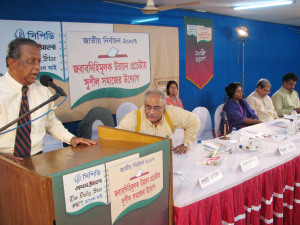 Khondoker said the people hope that honest and competent candidates will be elected.
Khondoker said the people hope that honest and competent candidates will be elected.
Fazlul Haque criticised the EC for rejecting the European Commission offer of providing transparent ballot boxes, without considering its importance.
The civil society should come forward with more courage, and the concept that there is no final word in politics should be banished from the country, Haque said.
He also said the vision paper should be prepared in phases otherwise it will not be effective.
Afzal Hossain said we want a terror free society and a black money free parliament.
He urged political leaders to speak out in party meetings about the deliberations of the regional dialogues. He said the intruders in politics are the main culprits as real politicians work for the country and want development. He said the dialogues have been successful and hoped that such initiatives will also succeed in the future.
Prof Anisuzzaman said, “We want to see an effective parliament and progress in the country.” He pointed out that a section of the people became rich suddenly through politics while many people went bankrupt in the political struggle.
“We want to see how much of the political parties’ pledges have been implemented,” he said adding that it requires accountability of the government.
Urging the politicians not to nominate black money holders in the election, Anisuzzaman further said, “We should also see whether the candidates played any negative role during the liberation war.”
He said the discrepancies between men and women, poor and rich should be minimised. He asked citizens to exercise their rights and to create pressure on politicians for implementing their demands.
Major General (retd) Moinul Hossain Cwdhury urged the people to judge competent candidates on the basis of character and not on the basis of wealth or influence.
He said foreign diplomats often get involved in the country’s domestic affairs, which is regrettable. He stressed the need for competent citizens as well as competent candidates.
The democratic practice will not be successful without removing corruption and terrorism from the society, he said adding that the political situation in the country is deteriorating day by day. “Now politics is a mix of democracy, thuggery and corruption.”
Editor of the Prothom Alo Motiur Rahman expressed doubts that the next election might not be held at all as the conflict between the two major political fronts culminated to the worst level. “There is hardly a congenial atmosphere in the political arena for holding dialogues.”
As a result the lack of confidence of the people on politicians is increasing. He urged politicians to fulfil the pledges and commitments they made to the people. He hoped for a balanced country. He said the people want to see the politicians beside them.
Rahman pointed out that political parties forget their commitments mentioned in party manifestos after going to power.
Debapriya Bhattacharya pointed out that the civil society initiative for competent candidates will continue and the outcome of 15 regional level dialogues will be placed before political leaders. He hoped that the political parties will incorporate the recommendations that came out of the dialogues in their election manifestos.
He said civil society leaders will sit soon with leaders of major political parties and place the recommendations before them. Dedicated and competent trends in the political parties have been strengthened by the dialogues, he observed.
He categorically said civil society members have no intention to be candidates in the next election but they want to strengthen the democratic process in the country. Another objective of the dialogues is to restore respect for politicians in the public mind, he pointed out.
Advocate khokon Shaha, general secretary of Narayanganj city Awami league, demanded electoral reforms before the next election. He pointed out that politics has been under the control of a few officials of the army since the 1975 coup.
He also demanded separation of the judiciary from the executive branch of the government and an independent anti corruption commission.
President of Narayanganj City Awami League Anwar Hossain, Montoo Ghos of the Communist Party of Bangladesh, Office Secretary of District BNP Zannatul Ferdous, Delwar Hossain Chunnu of Gono Forum, Shafiuddin Ahmed of Workers Party, Advocate Mahbubur Rahman Ismail of BSD, President of Narayanganj City NAP Nurul Kabir, Convener of Narayanganj City Bikalpa Dhara ATM Kamal, former MP Golam Murshid Faruqi, President of Narayanganj Press Club Ruman Reza, Tofazzel Hossain, Abdul Hai, Rafiur Rabbi, Dulal Shaha, Shukur Mahmud, Ahsanul Karim Chowdhury, Mahmuda Mala, Golam Mostafa, Advocate Awlad Hossian, Komol Kanti Shaha, Khondoker Anwar Hossain, Chandan Shil, Halim Azad, Sheikh Haider Ali, MK Mannan, Jahanara Akhter, Khodeza Khanom Nasreen, Ranu Khondoker, Advocate Sadia Afroz, Rashida Akhter, Al Amin, Alauddin Chowdhury, Anis Ahmed, Mobarak Hossain Rana, Rekha Chowdhury, Munir Chowdhury, Kawsar Uddin Ahmed, ASM Shafiqul Islam, Reazur Rahman, Solaiman Chowdhury, Monwarul Haque, Ishaq Talukder, Amzad Hossain Alauddin Chowdhury, and Advocate Marina Begum also took part in the discussion.


